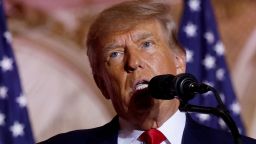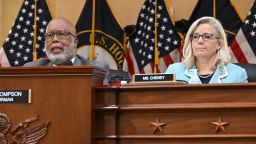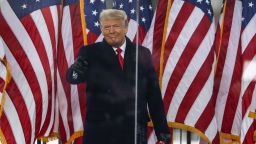Editor’s Note: Julian Zelizer, a CNN political analyst, is a professor of history and public affairs at Princeton University. He is the author and editor of 24 books, including his forthcoming co-edited work, “Myth America: Historians Take on the Biggest Lies and Legends About Our Past” (Basic Books). Follow him on Twitter @julianzelizer. The views expressed in this commentary are his own. View more opinion on CNN.
Concluding its final public meeting Monday, the House January 6 committee released a summary of its key findings — the conclusions of which are devastating, even if they lack all the details expected in the final report.

Following 18 months of deliberations and hearings, more than 1,000 witnesses and countless documents, the committee has produced a blistering account accusing former President Donald Trump and his allies of attempting to overturn the 2020 election.
For anyone who continues to believe that the January 6, 2021, insurrection was exaggerated or was a haphazard, amateurish effort gone bad, the final report should throw cold water on those beliefs. The committee’s recommendations are historic.
The panel made four criminal referrals against Trump, including charges of insurrection, to send to the US Justice Department. If the United States is to survive as a “nation of laws and democracy,” the committee’s chairman, Rep. Bennie Thompson, said we can “never let this happen again.”
The referral is largely symbolic because it doesn’t obligate federal prosecutors to bring criminal charges.
But the committee’s findings have provided a formidable body of evidence that there was an elaborate effort, led by the President of the United States and his Republican allies in Congress, to systematically overturn an election that he lost.
The committee documented what it said was Trump’s intentionality, strategy and planning behind the dangerous effort to overturn votes, to find new votes and ultimately to stoke an attack on the US Congress, even though he knew he had lost.
“President Trump was informed over and over again, by his senior appointees, campaign experts and those who had served him for years,” the executive summary states, “that his election fraud allegations were nonsense.” The panel relied on the testimony of some of Trump’s top advisers to build its case as well as the public record.
The committee found that Trump stoked the violence with incendiary tweets and that the White House was purposely slow in responding to the insurrection at the US Capitol.
Citing former President Ronald Reagan, a conservative icon, Rep. Liz Cheney, one of the panel’s two Republicans, argued that the “peaceful transfer of power” was a “miracle” of our system and only one President — Trump — had failed to abide by this process.
When the mob attacked the Capitol, Cheney added, Trump engaged in “shameful” behavior by sitting and watching the violence on television. His actions, Cheney said, were “unlawful” and “an utter moral failure” and a “clear dereliction of duty.” When he finally agreed to call off his supporters, Rep. Elaine Luria noted, he did so with language that justified what the rioters had done.
The findings certainly rank among the worst scandals in presidential history. It is fair to say that a sitting President being part of a concerted effort to reverse his own election stands alongside the abuses of power that President Richard Nixon engaged in and the violations of law under the Reagan administration exposed during the Iran-Contra hearings.
Without question, the revelations far overshadow the allegations that were at the center of President Bill Clinton’s impeachment.
In other words, the committee concluded that Trump made history by participating in an unrivaled abuse of presidential power that threatened the very foundation of our democracy: elections. While the term “unprecedented” has been grossly overused, in this case the term works.
But the question is what impact will the January 6 committee’s final report have when it’s released Wednesday?
The committee has done its business at a moment in American history when shock and awe among the public seem impossible. The historic impact of congressional investigations has always depended on the ability of elected officials to move the political needle by producing findings that prove a leader acted far outside the parameters of what’s acceptable.
The “smoking gun” tape that allowed legislators to hear Nixon obstructing an investigation were enough in 1974 for politicians in both parties to say enough.
The discoveries that national security officials in the Reagan administration violated the Boland Amendment by sending money and arms to the Nicaraguan Contras caused Reagan’s approval ratings to plummet and put his legacy in jeopardy.
The President was only saved by the fact that the committee could not directly connect the illicit operation to him and by the fact that the administration mounted an effective public relations campaign to win back public support. Congressional Democrats, moreover, decided that they wouldn’t pursue impeachment.
Even Clinton’s scandal, which was over an issue far less relevant than what faced Nixon or Reagan, clearly contradicted his public statements and legal testimony about the subject after DNA evidence emerged of his affair with Monica Lewinsky.
We live in a period today where it is unclear that any congressional investigation can still have an outsize impact. One of the factors that makes it difficult for Congress to shift political momentum is that intense political polarization overwhelms all other concerns.
Even 9/11 or the pandemic didn’t produce a serious political realignment. Polarization is almost always triumphant, even when the leader of a party is found to have committed egregious abuses of power.
Another related challenge stems from what social scientists call “asymmetric polarization.” The Republican Party has moved further to the right than Democrats have to the left. And much of the extremism in the GOP has been tactical, where some party leaders have embraced a form of smashmouth partisanship with no guardrails as to what is permissible.
In this case, the odds that the relevant party will change its ways or respond are minimal. It is worth remembering that Senate Republicans originally filibustered the plan to set up an independent, bipartisan commission to investigate January 6 and did not cooperate with the congressional committee set up instead.
The Republicans who did serve on the committee — Cheney and Rep. Adam Kinzinger of Illinois — have been attacked, marginalized and essentially pushed out of the party. During the 2022 midterms, election denialism was a central campaign theme for the GOP rather than an issue candidates ran away from.
Nor does our media ecosystem lend itself to the sort of reaction that took place with Watergate. While there was a time, such as the 1970s, when professional journalists coalesced around the facts presented by a judicious investigation, those times are gone.
Partisan media outlets such as Fox News ignore the weight of evidence. Show hosts are more than willing to spin the news in a particular direction that satisfies political yearnings.
In the coming weeks, there will likely be stories that misrepresent what the committee discovered and that will promote conspiratorial claims with no basis in fact. The filter-less world of social media probably will offer ample opportunity to push disinformation that contradicts the harrowing stories found in the report.
The opposition in the congressional investigation of Iran-Contra put out a minority report in 1987, but today that is no longer necessary. Opponents of the committee have multiple platforms and opportunities to spin a different tale that undercuts the power that the official findings will have.
And some of the forces that will check the impact of the report stem from a broader national culture that seems incapable of staying focused on issues for long. In our short attention span, everything must be new and fresh; we push the media from one issue to the other — and much of the news media happily oblige — with the lightning speed of TV commercials.
The January 6 committee already has experienced this challenge as dramatic televised hearings, which proved capable of shifting attention to how bad the coup attempt had been, were quickly drowned out by the latest celebrity scandal or news story coming from Washington. There are so many outlets for information that it is virtually impossible to keep the public eye committed to any single subject.
The Watergate scandal was the story that defined much of the period between 1972 and 1974, but for many Americans January 6 has just become one other thing among many that happened in the chaos of our era.
Finally, Attorney General Merrick Garland now faces a politically perilous decision of whether to indict Trump, especially since he is now officially one of President Joe Biden’s campaign opponents in 2024. Garland has appointed a special counsel, Jack Smith, who is overseeing the investigations of Trump and will make recommendation s.
The question is whether this report will push Garland toward taking action to ensure accountability rather than focusing on concerns about fueling division within the electorate.
Given its expected dramatic findings, the January 6 report is certainly a stress test for the problematic state of our democracy. It is unlikely, however, to change the basic dynamics.
Barring successful prosecutions of key players, the odds are that within a few months many Americans may tragically think of the report as ancient history, rather than compelling evidence accusing a major 2024 presidential candidate of coming close to overturning results of the election system that’s the best our democracy has to offer.




